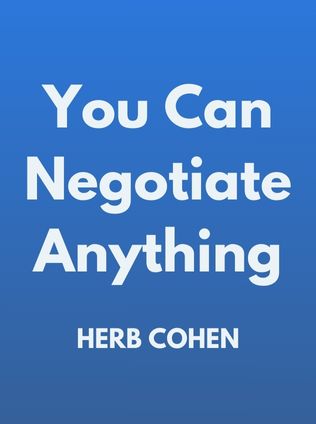
You Can Negotiate Anything
The World's Best Negotiator Tells You How To Get What You Want
By Herb Cohen
Published 09/1980
About the Author
Herb Cohen is widely regarded as one of the world’s leading experts in negotiation. Over his extensive career, Cohen has been involved in some of the most critical negotiations of the 20th century, including advising the U.S. government during the Iranian Hostage Crisis and the hijacking of TWA Flight 847. His insights into the art of negotiation have been featured in prominent publications like Time, The Economist, and Playboy, the latter of which dubbed him "the world’s best negotiator." Cohen's work has also made a significant impact in the corporate world, where he has advised numerous Fortune 500 companies. His book, "You Can Negotiate Anything," distills his years of experience into practical advice aimed at helping readers navigate the complex world of negotiation, whether in business, politics, or everyday life.
Main Idea
"You Can Negotiate Anything" by Herb Cohen is a comprehensive guide that demystifies the art of negotiation, making it accessible to everyone. Cohen argues that negotiation is not just for diplomats or business leaders but is an essential skill for everyday life. The book emphasizes that negotiation is a game—a game you can master with the right strategies, mindset, and preparation. Whether you are negotiating a business deal, a salary increase, or even deciding on family vacation plans, Cohen's insights provide a roadmap to achieving win-win outcomes. The book covers various negotiation styles, from collaborative win-win scenarios to more competitive, win-lose situations, teaching readers how to adapt their strategies based on the context and the other party's approach.
Table of Contents
- 1. The Ubiquity of Negotiation
- 2. Crafting Win-Win Negotiations
- 3. Building Trust in Negotiation
- 4. Competitive Negotiation Strategies
- 5. Leveraging Power and Confidence
- 6. Understanding and Using Time Limits
- 7. The Role of Emotions in Negotiation
- 8. Protecting Yourself from Manipulation
The Ubiquity of Negotiation
Cohen begins by highlighting the pervasiveness of negotiation in everyday life. He explains that negotiation is not confined to boardrooms or diplomatic meetings; it is something we all engage in daily, often without realizing it. Whether deciding on dinner plans, haggling over a purchase, or determining the distribution of household chores, negotiation is an intrinsic part of human interaction. Cohen’s main argument is that once you recognize negotiation as a ubiquitous element of life, you can approach these interactions more strategically and effectively.
Understanding the omnipresence of negotiation helps you to be more aware of the opportunities to achieve better outcomes in various aspects of life. Cohen encourages readers to see negotiation as a game—a game that can be mastered with the right mindset and strategies. He states,
"Negotiation is the art of getting what you want while making the other person feel like they’ve won."This perspective shifts the focus from confrontation to collaboration, where both parties can achieve their goals.
everyday negotiations include:
- Negotiating with Family: Deciding where to go for a family vacation by considering everyone's preferences and finding a mutually satisfying destination.
- Purchasing a Car: Haggling with a car dealer to get the best price while ensuring the dealer feels satisfied with the sale.
- Workplace Discussions: Negotiating workload distribution with colleagues to ensure fairness and efficiency.
Crafting Win-Win Negotiations
Cohen emphasizes that the most effective negotiations are those where both parties feel like they have won. This concept, known as win-win negotiation, is the cornerstone of Cohen’s philosophy. He argues that negotiation should not be seen as a zero-sum game where one party’s gain is another’s loss. Instead, the goal should be to find creative solutions that satisfy the needs and desires of all parties involved.
Win-win negotiation is built on the foundation of trust and collaboration. According to Cohen, the first step in crafting a win-win negotiation is to establish a common goal. This means starting the conversation by stating that you want to find a solution that benefits everyone. Once both parties agree on this common goal, the negotiation shifts from a confrontational stance to a collaborative effort.
To achieve win-win outcomes, Cohen provides several practical tips:
Sign up for FREE and get access to 1,400+ books summaries.
You May Also Like
The Subtle Art of Not Giving a F*ck
A Counterintuitive Approach to Living a Good Life
By Mark MansonRich Dad Poor Dad
What the Rich Teach Their Kids About Money - That the Poor and Middle Class Do Not!
By Robert T. KiyosakiHow To Win Friends and Influence People
The All-Time Classic Manual Of People Skills
By Dale CarnegieQuiet: The Power of Introverts
The Power of Introverts in a World That Can't Stop Talking
By Susan Cain



















